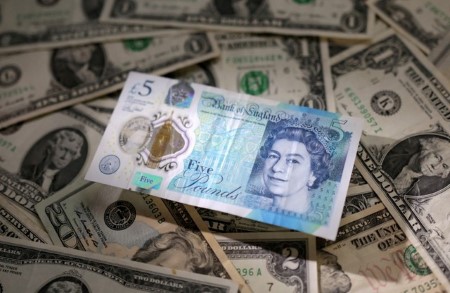




Philippines Trade Update: Imports weaken on tepid demand
 DOWNLOAD
DOWNLOAD

Policy Rate Updates: BSP outlook — cloudy with a chance of rate cut
 DOWNLOAD
DOWNLOAD

January Economic Update: Growth slows, prices rise
 DOWNLOAD
DOWNLOAD


US recap: Dollar up but UK inflation helps sterling buck the trend

April 19 (Reuters) – The dollar index rose on Wednesday but came off its highs after meeting rejection at Monday’s peak while gains in 2-year Treasury-bund yields spreads topped out along with risk-off flows that had provided fuel earlier.
Above-forecast core inflation readings from the euro zone limited EUR/USD losses, while the UK’s well above forecast 10.1% March inflation pushed sterling broadly higher given the enormous delta between the BoE’s current 4.25% rate and inflation.
Sterling was left with gains of 0.12% after coming off its 1.24745 highs, with this week’s lows clustered near the rising 21-day moving average support.
EUR/USD rebounded from its lows by Tuesday and Monday’s lows, but was still down 0.18% in late trade.
USD/JPY hit fresh April highs by upper channel and Bolli band resistance, clearing the 61.8% Fibo of March’s slide at 134.75, but later retreated from its strongest levels of the day to stand 0.47% firmer on the day.
Rising Treasury-JGB yields spreads are underpinning USD/JPY as JGB yields are again being capped by the BoJ’s reaffirmed yield curve control policy.
Treasury yields are rising due to pricing out of rapid Fed rate cuts that markets projected during March’s banking crisis, and in response to US core inflation rising to 5.6% and the jobless rate falling to 3.5% in March.
Wednesday’s elevated European inflation readings also add to the sense that inflation is more tenacious than expected and will require rates, particularly from the ECB and BoE, to rise further and for longer. Yet the market is straining to price in more than one more 25bp Fed hike that is then followed by roughly 50bp of cuts by year-end.
Divergent central bank policy expectations leave the dollar index precariously perched above February and April’s 100.80/78 trend lows.
Thursday features US jobless claims, Philly Fed, existing home sales and leading indicators, all leaning toward a cooling economy per Wednesday’s beige book.
(Editing by Burton Frierson; Randolph Donney is a Reuters market analyst. The views expressed are his own.)
This article originally appeared on reuters.com





 By Reuters
By Reuters